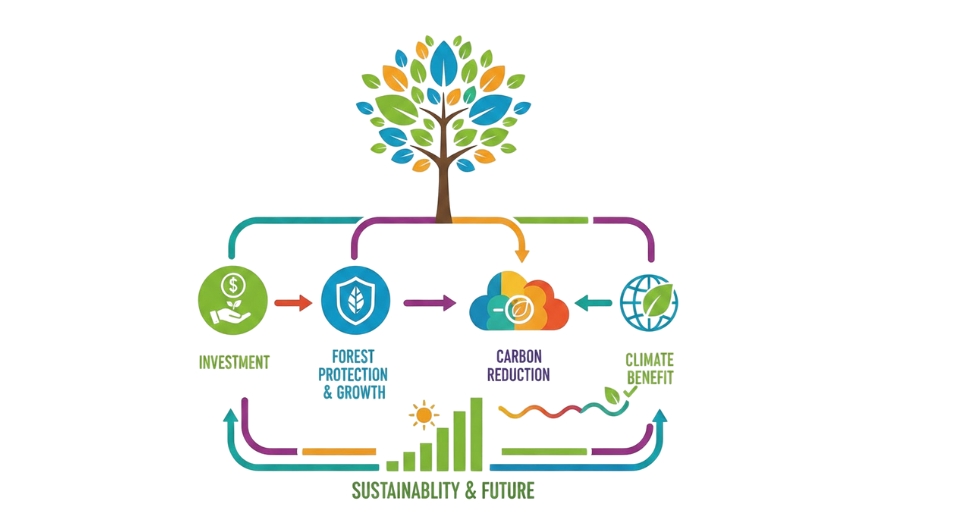
Nov 22, 2025

Metastat Insight, a well-established source for market intelligence, has published an exhaustive report entitled voluntary carbon offsets for forestry market. This report elaborates on the expanding opportunity in the global voluntary carbon offsets for forestry market, emphasizing the growing opportunities for the growth, management and implementation of forestry-led projects for carbon sequestration and climate change mitigation.
Offsets for voluntary carbon forestry are critical for stimulating climate action, ecological diversity, and sustainable land use. The report describes the growing uptake of forest projects that let companies, governments, and individuals voluntarily counteract their carbon footprint. These projects are also based on afforestation, reforestation, forest restoration and management practices that sequester carbon and avoid disrupting ecosystem resilience.
Highlights from the Metastat Insight Report:
Sustainable and Increasing Demand:
The global market for voluntary carbon offsets for forestry is on a sustainable and increasing growth desiring. With companies framing corporate sustainability as a priority, garnering governmental initiatives, and building awareness of climate footprint, demand continues to be in demand across multiple industries who are adopting net-zero, carbon neutrality or sustainable practices.
Identifying Types of Projects:
The research distinguishes types of offset projects interrupted around forestry, including afforestation projects, reforestation projects, and conservation of natural forests. Together, types of offset projects aim to achieve different environmental, social, and economic goals and offer the opportunity to meet goals around sustainability while addressing the welfare of local communities.
Standards such as the Verified Carbon Standard (VCS) and the Gold Standard provide clarity, transparency, and confidence in environmental outputs, promoting rigorous reporting which contributes to transparency and assurance for stakeholders.
Regional insights:
A survey and analysis regarding forestry projects reveals trends related to geographic and regulatory factors, and uptake in North America, Europe, Asia Pacific, Latin America, and the Middle East and Africa, each factor being more or less specific to the geographic or regulatory conditions or uptake trends present. Regional insights provide a much more nuanced picture of local issues, stakeholder engagement, and potential investment opportunities.
Competitive Landscape:
The study reflects existing and emerging players and their role in the market for project developers, sustainability consultants, or forest carbon exchanges. Collaborative arrangements with governmental bodies, non-governmental organizations, and corporate clients are highlighted as important for expanding the forestry offset project field, which creates a system of ecological values for the long-term.
Integration of Technologies:
The report reflects on emerging technological advances surrounding remote sensing, satellite imagery, and geographic information systems (GIS) that provide ease and efficiencies in carbon measurement, reporting, and verification of forest carbon. Data-based techniques offer precision, efficiencies and transparency associated with forestry offset projects.
Market Education and Awareness:
Special consideration is provided to the increasing importance of outreach programs, stakeholder participation, and capacity development activities. These activities encourage responsible adoption of projects, informed participation, and enhance credibility of voluntary carbon offsets for forestry.
Investment Potential: The report illustrates opportunities for private sector investment, green lending, and cross-sector collaborations. Increased focus on sustainable supply chains and corporate social responsibility is driving greater financial backing for forestry offset initiatives, providing opportunities for long-term returns and environmental influence.
Sustainability and ecosystem services: Beyond carbon sequestration, forest offset projects can offer some ecological service benefits in addition to general ecological services, such as protecting soil, regulating the water cycle, providing habitat, and protecting biodiversity. The report articulates the net benefits of these improvements in building environmental resilience and ecosystem integrity.
Policy/contextual: The report discusses the policy landscape, regulatory agreements and risk management associated with appropriate implementation of forest offset programs. The legal status of lands for forestry, assurance of land tenure and contractual obligations of participating parties, will all come together to help ensure the project is credible and will last a long time.
Connection to broader climate actions: Voluntary forest offset programs are increasingly being considered in corporate and public climate actions-renewable energy, emissions reductions programs, sustainable land use planning. Integration facilitates an integrated approach to climate mitigation while generating reputational value for participating organizations.
The report also reviews mechanisms for long-term monitoring and reporting that guarantee measurable and verifiable results. Independent audits, regular reviews, and computer tracking tools enhance the integrity and effectiveness of voluntary carbon offsets for forestry.
Metastat Insight in-depth report on the international voluntary carbon offsets for forestry market is an essential guide for project developers, environmental consultants, corporate sustainability teams, and strategic investors. Through the delivery of actionable information on project types, regional trends, verification standards, and technological integration, the report empowers stakeholders with the intelligence necessary to steer the intricate and socially impactful market. With increased take-up and changing methodologies, the global voluntary carbon offsets for forestry market stands poised as a key part of global climate action measures and sustainable land management initiatives.
Drop us an email at:
Call us on:
+1 214 613 5758
+91 73850 57479